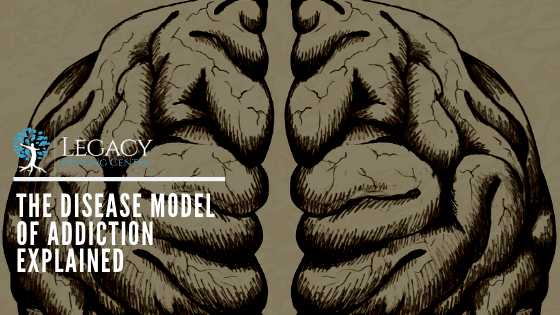
The Disease Model of Addiction Explained
Legacy Healing Center Blog
Many people inaccurately view addiction as a choice and a lack of moral character rather than a chronic illness. The idea that addiction is a choice results in a stigma surrounding it. Due to the stigma of addiction, many unfairly minimize the cunning mental aspect and painful physical dependence that individuals who suffer from this disease experience. With modern science continually advancing, we are able to understand more and more about the essence of addiction each day.
Although excessive and long term substance abuse causes changes in the brain, some signs and symptoms may be pre-existing in the brain of an addict. Similar to other diseases such as diabetes and heart disease, addiction is caused by a combination of environmental, behavioral, and biological factors.
Genetic makeup is responsible for about half of the likelihood that a person will develop an addiction, as those with parents who are addicts are 2x more likely to have a substance use disorder themselves. In addition, if a person suffers from a mental illness or has experienced any adverse childhood experiences, such as trauma or abuse, they are more likely to misuse substances and develop an addiction than those who have not.
Changes in the Brain
When a drug is taken, feel-good chemicals like dopamine are released in the brain causing a feeling of euphoria. As a substance is abused over time, the reward pathways in the brain become accustomed to the overflow of dopamine and begin to demand it. The reward centers in the brain also affect judgment, learning, memory, and decision making, so certain behaviors become hard-wired, such as the compulsive behavior to abuse drugs. After these changes occur, what was once mere substance use can turn into full-blown drug addiction.
Physical Manifestations
After a drug is taken repeatedly over an extended period of time, a person will develop a tolerance to the substance. This tolerance is characterized by needing a larger quantity or higher potency of substance in order to achieve the desired effects. Once tolerance develops, it is likely that a physical dependence will, too.
If a person has a physical dependence, it will become necessary for them to rely on the drug to function normally. They will experience withdrawals when the drug is not taken. Since withdrawal symptoms can be so painful and monotonous, many will continue to abuse drugs even when they want to stop in order to avoid going into withdrawal.
Mental Aspect of Addiction
The mental anguish a person with an addiction may endure is perhaps the most horrific aspect of drug addiction. They may become so delusional as to say they will only have one, then find themselves craving more and being unable to control these cravings. Despite knowing right from wrong, many addicts will engage in risky and illegal behaviors to get their drugs because the mental obsession is so inexplicably strong. They may suffer from anxiety, depression, and even psychosis as a result of drug use. Once a person has crossed the line from drug abuse to addiction, they will have lost the power to choose whether or not they use drugs. Without professional treatment, it can be difficult or near impossible to stop.
Why accepting addiction as a disease is important
Due to the physical and mental manifestations of addiction, many addicts will be unable to quit using drugs cold turkey on their own will power. Once a person’s brain has changed into the brain of an addict, they will always be an addict. Even though addiction is a permanent, progressive illness, it can be treated through detox, rehabilitation treatment, and aftercare. Since addiction is characterized by distinguishing signs and symptoms that can be treated, it can rightfully be considered a disease.
Viewing addiction as a disease rather than a choice has extensive benefits. If addiction is a disease, the stigma that surrounds it can be alleviated. Addicts can be seen as people with a chronic illness rather than a lack of moral righteousness. In addition, insurance companies are more apt to cover costs for addiction treatment and counseling in the same way they do for mental illnesses. When it comes to healthcare professionals, looking at the differences in the brain of an addict than that of a person who is not, improvements can be made in the way addiction is treated. If addiction becomes more widely accepted as a disease, those who are suffering can feel more comfortable in reaching out for help. As a result, lives can be saved and people can recover.